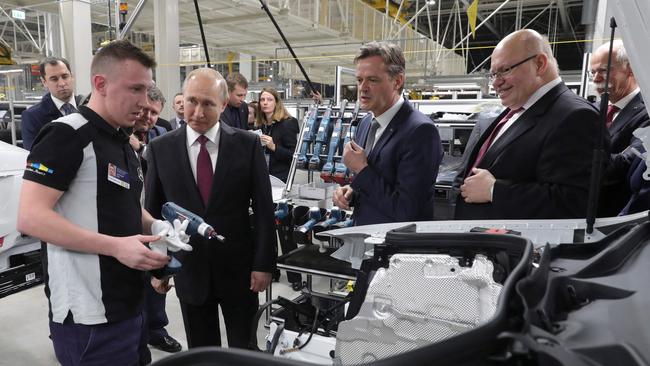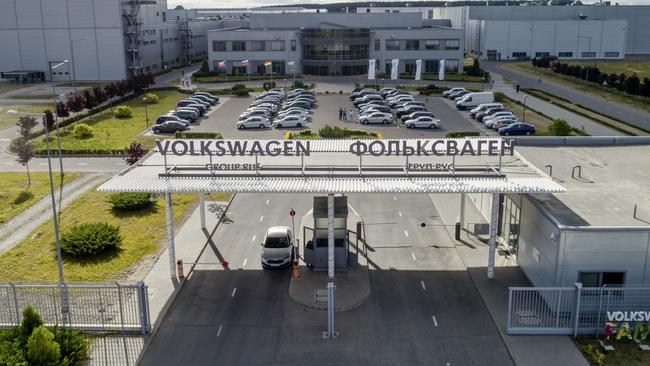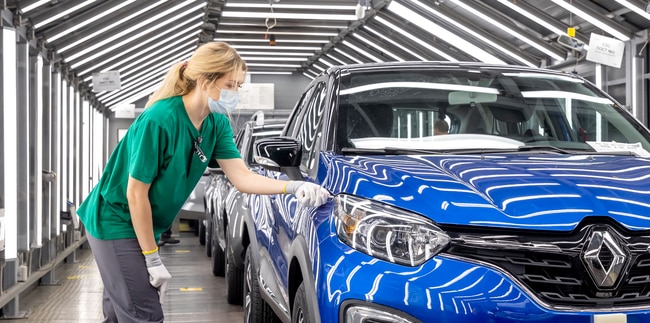Porsche, Volkswagen, Mercedes Benz, Toyota, Renault join sanctions against Russia
Volkswagen, Toyota and BMW join growing list of carmakers stopping exports to Russia, while Mercedes-Benz has shuttered its $375 million Moscow plant.

The world’s biggest car companies have joined the global movement to punish Russia for its aggression in Ukraine, slamming the brakes on exports of vehicles to the country, or shutting down manufacturing facilities within its borders.
It’s about to get a lot harder for an oligarch to buy a Bentley, or a Porsche, as those two brands joined VW, Mercedes-Benz, Nissan, Renault, Honda, BMW, Ford, General Motors, Volvo, Jaguar Land Rover and the world’s biggest car company, Toyota, in suspending their operations in Russia.
While many companies have ceased to export their vehicles to the country for sale, production of new VW and Skoda models at the company’s two Russian factories were also ceased this week, “with immediate effect”.
Staff would be given paid leave during the shutdown, VW announced.

Mercedes-Benz opened a new plant in the Moscow region in 2019, at a cost of $375 million, but it has also suspended production as well as stopping exports.
US-based giant General Motors said its decision to suspend exports was in line with international sanctions against Russia.
“GM is committed to complying with the laws and regulations of the markets in which we do business, including applicable US economic sanctions and export control laws and regulations,” the company said in a statement.
German sports-car manufacturer BMW took a more direct approach in its announcement. “The BMW Group condemns the aggression against Ukraine and follows the developments with great concern and dismay,” it said.
“We expressly support the sanctions decided by politicians. Due to the current geopolitical situation, we will stop our local production and export for the Russian market until further notice.”
While Russian sales made up a not insignificant 216,000 units a year for VW, the decision to cut off the market would be easier for companies like Ford and Volvo, which aren’t big sellers in Russia.
It will be much more difficult for a company like Renault, however, for which Russia is its second largest market, after its home country of France.
The Renault Group accounts for nearly 40 per cent of Russia’s vehicle production, according to research firm IHS Markit, and has three car-assembly plants in Russia.

Overall, Russia’s invasion could shrink global production of motor vehicles by millions of units, not just through the shutdown of manufacturing within its borders, but via supply chain issues and what Jeff Schuster, president of global forecasting at LMC Automotive, calls ripple effects.
“There’s no question. It’s going to ripple. It’s just going to be really dependent on how long this goes on,” Mr Schuster said. “The sanctions and trade impact play a big role in that.”
The war and attendant sanctions are expected to further exacerbate the existing global shortage of semiconductor chips, which are made using materials, including neon gas and palladium, sourced from within the region.
With fewer cars being made and consumers being forced to wait even longer for in-demand models, prices could also be forced up.
“This does have global implications in terms of adding to inflationary pressure, pricing pressure and ultimately dealing another blow to the consumer,” Mr Schuster added.
Brands including Audi and Mercedes-Benz have also said they will have to cut production output at European plants, due to parts disruptions out of Ukraine where vital wiring harnesses are made.



To join the conversation, please log in. Don't have an account? Register
Join the conversation, you are commenting as Logout